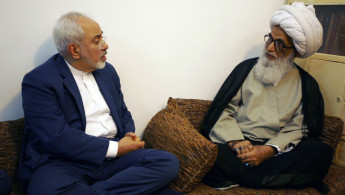Zarif briefs top Shia cleric Sistani on nuclear deal
Iranian foreign minister, Javad Zarif, will speak with Iraq's highest Shia authority Ayatollah Ali al-Sisitani at his home in Najaf, before a visit to the Imam Ali shrine in the city.
Sistani is considered to be the religious head of Iraq's Shia majority, and although he lives an austere life the Shia leader carries huge influence in the corridors of power in Baghdad.
Later today, Zarif is due to fly out to meet political leaders in Baghdad including Iraqi President Fouad Masoum, Prime Minister Haider al-Abadi, Parliament Speaker Salim al-Jabouri, and Foreign Minister Ibrahim al-Jaafari.
According to Tasnim News, Iranian and Iraqi officials are expected to discuss regional issues, and the 14 July agreement Iran reached with P5+1 states over its nuclear programme.
Gulf concerns
Zarif is taking part in a brief tour of the region, having already visited Kuwaiti leaders on Sunday.
At the Iranian embassy in Kuwait, Zarif called on regional powers to work together to defeat common enemies such as the Islamic State group.
"Any threat to one country is a threat to all ... No country can solve regional problems without the help of others," Zarif said.
Iran has been at loggerheads with Gulf countries over its alleged interference in Gulf affairs and material support for Syrian leader Bashar al-Assad.
Many GCC countries - particularly Saudi Arabia - are concerned that Iran's recent agreement with the West will strengthen Tehran's hand in regional matters.
Iran is said to be supporting Iraqi Shia militias who are taking part in the battle against Islamic State fighters, and are thought to have committed human rights violations of their own.
"Iran stands behind the people in the region to fight against the threat of extremism, terrorism and sectarianism ... Our message to the regional countries is that we should fight together against this shared challenge," Zarif concluded.





 Follow the Middle East's top stories in English at The New Arab on Google News
Follow the Middle East's top stories in English at The New Arab on Google News


